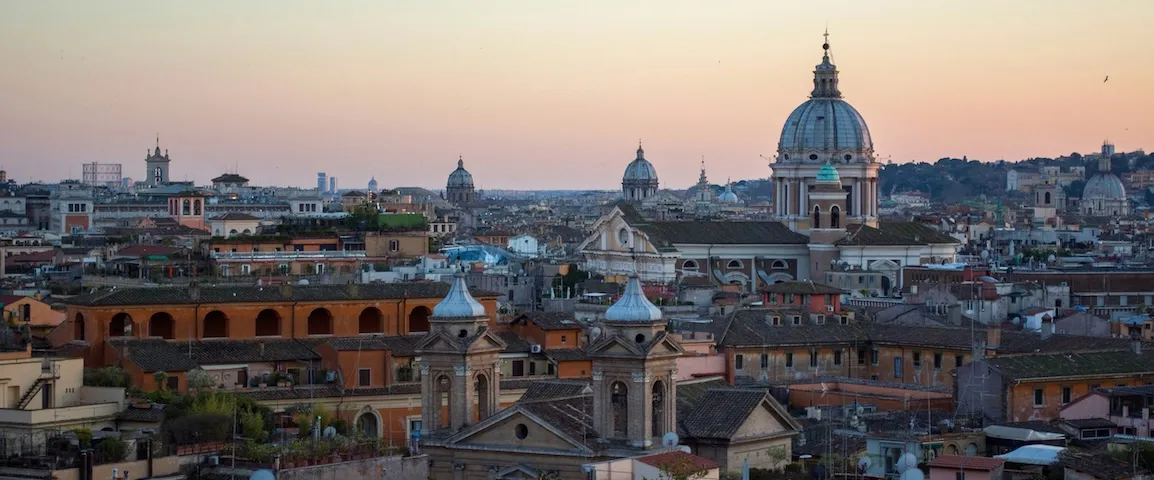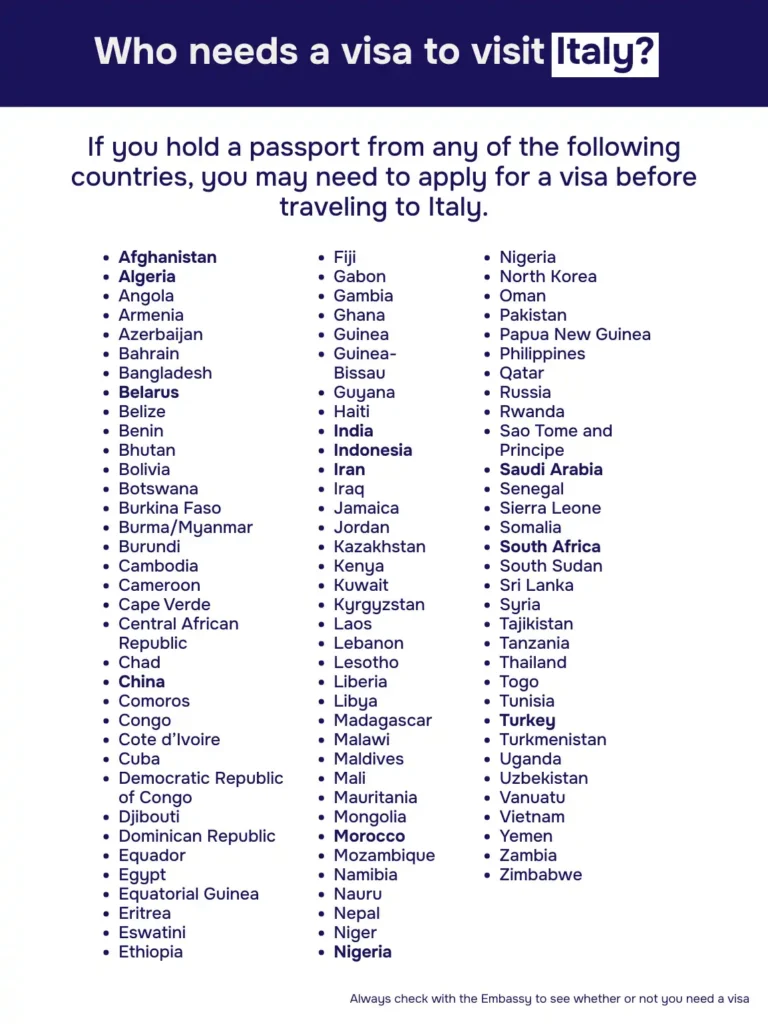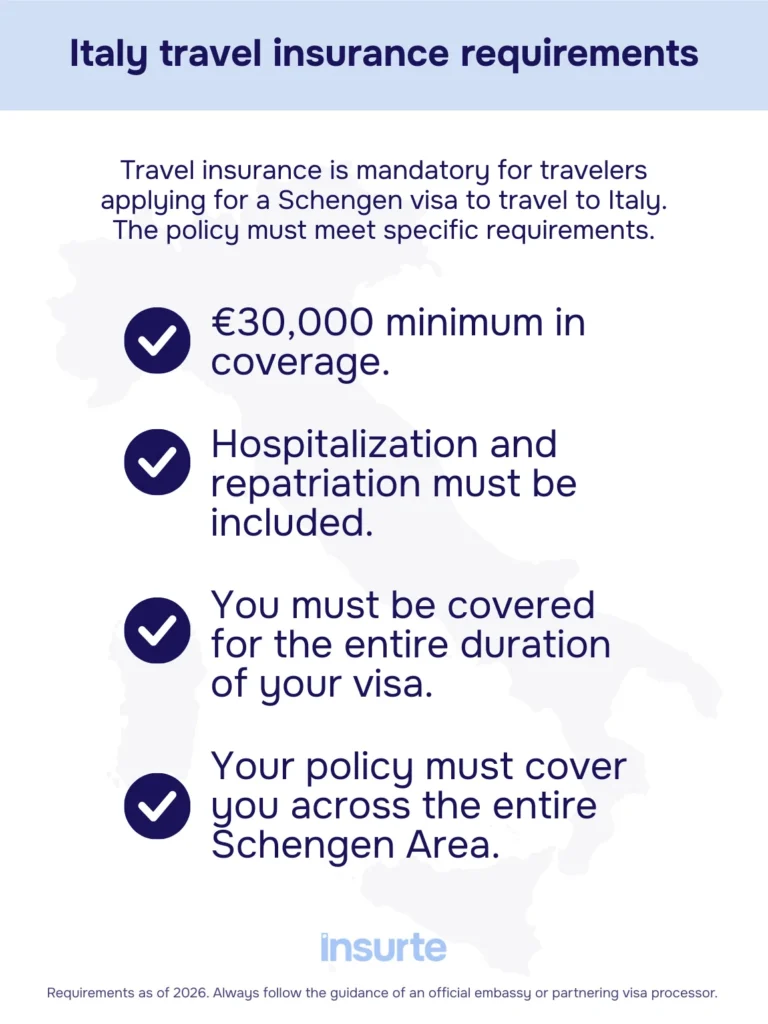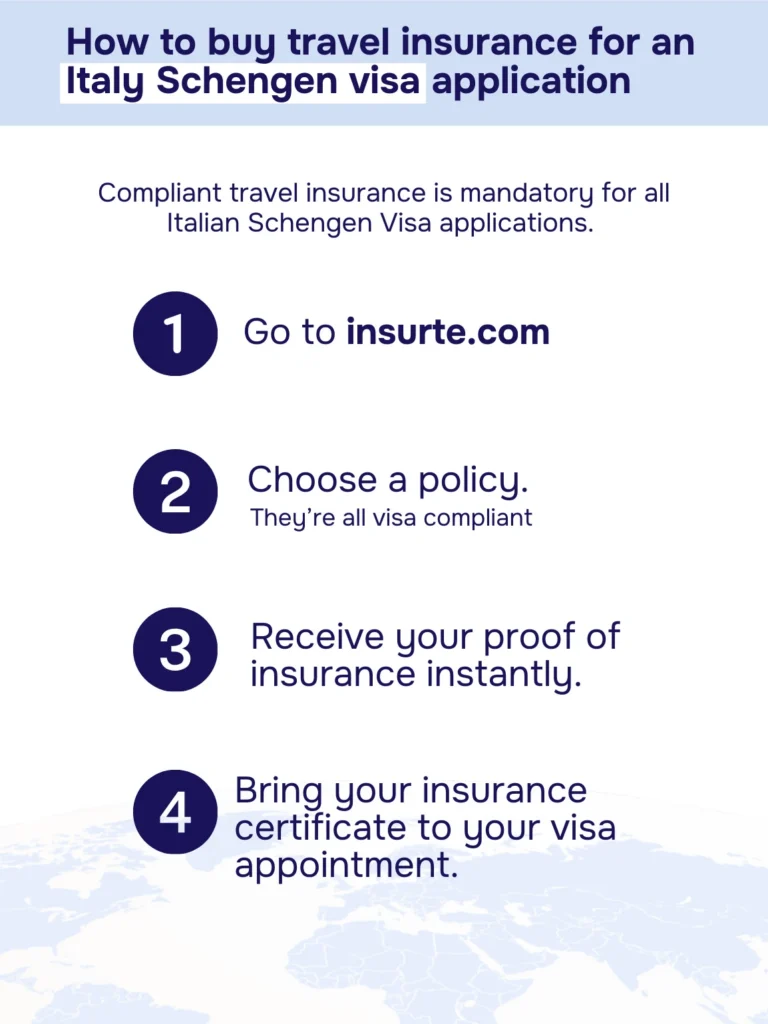Home > Schengen Visas for Italy: What You Should Know

Schengen Visas for Italy: What You Should Know
Rome, Venice, Bologna, or Naples... and everywhere in between. Italy is a large country with varying landscapes, geography, and so many things to see and do.
These are just a few of the things that make Italy so appealing to travelers. In 2024, 1.2 million people applied for Schengen visas for Italy. While the data hasn't yet been released for 2025, visa application rates are trending up and continue to grow year over year.
While not everyone needs a visa to travel to Italy, many people do need one: A Schengen visa.
To apply for one, you have to meet several different requirements, ranging from proving you have a place to stay to Schengen travel insurance, and more.
The requirements and process aren't complicated, but they are specific, and you need to make sure that you follow them closely.
We're going to take a look at how to apply and what the process/requirements entail.

Who needs a Schengen visa for Italy
The easiest way to find out whether or not you need a Schengen visa is by visiting the Italian Embassy website. There, you will be asked a few questions and find out whether or not you need to apply.
Whether or not you need a Schengen visa for Italy depends on a few things:
- Your nationality (the country that issued your passport).
- How long you intend to stay.
- Why you're traveling to Italy.
In most cases, if you are a citizen of India, China, Saudi Arabia, or dozens of other countries, you will need a Schengen visa to go to Italy, even for short trips.
If you're a citizen of an EU/Schengen country, you are exempt from needing a visa.

The Italian Schengen visa application process
Applying for a Schengen visa for Italy is the same process as it is for other Schengen countries. If you've applied for a Schengen visa for a different country before (such as France), you'll need to start that process again.
Depending on where you live, the place where you apply for your visa may vary. Where you apply will need to apply depends on where you currently live (your legal address).
US Residents: If you're a legal resident of the United States, you will need to apply for a Schengen visa through the Italian consulate that serves your state's region.
UK Residents: Legal residents of the UK need to apply for their Italian Schengen visa through VFS Global.
If you break down the process into the simplest terms, you will need to:
- Know which visa you need to apply for (a common choice is a Schengen visa for tourism (short-stay)).
- Gather all of the required documents for your visa application.
- Book a visa appointment.
- Attend your appointment and submit your application in person.
- Wait for your file to process, then receive an answer.
From start to finish, the Italian Schengen visa application process typically takes several weeks. Once submitted, application processing times are around 15 days.

Applications are in-person
With how the process works today, you can't apply for a Schengen visa for Italy online. Applicants are required to submit their applications in person during their visa appointment.
There is an online platform called EU VAP that is currently being built. EU VAP will allow travelers from all over the world to apply for their Schengen visas online. It isn't available yet, though, and isn't expected to be operating until after 2030.
Visa approvals and rejections
Even if you meet the visa requirements, it doesn't mean that a visa approval is guaranteed. Schengen visa approvals are never guaranteed.
The best thing that you can do is pay close attention to the requirements and provide all of the requested documents in the correct formats.
It's also important to pay close attention to even the smallest details. Inconsistent dates, typos in passport numbers or names, and other little errors can cause delays or even rejections.
Italian Schengen visa rejection rates
In 2024, 10.9% of Italian Schengen visa applications were denied globally. In 2023, it was 12.05%. We'll update this page when the data from 2025 is ready.
Rejection rates need to be taken with a grain of salt. They are averages, and many different components contribute to them, like nationality, visa-type, seasonality, and more. On top of that, visa rejection rates are regularly changing, as they're fluid.
This means that rejection rates aren't a reliable indicator as to whether or not your application will be approved or denied.

Italian Schengen visa requirements
Before we look at the requirements, there is an important distinction that needs to be made. These are the requirements for Schengen visas for Italy.
There isn't just one type of Italian visa; there are many, especially for those planning to stay in Italy longer than 90 days.
These are the requirements for Schengen visas for short trips for tourism/business/visiting friends and family. In this context, short trips are trips fewer than 90 days.
Other types of Italian visas will likely have other requirements, so always check with the Embassy.
Italian Schengen visa requirements (Type C, Short Stay)
Usually, all of the documents below are required. When you start the process, you'll get an official checklist with details about each. Make sure you follow it closely.
- A valid passport.
- Recent passport-sized photos that adhere to Schengen photo requirements.
- Proof of Schengen-compliant visa insurance.
- Your itinerary (including airline tickets).
- Your hotel bookings or other proof of accommodations.
- Proof of sufficient funds to support yourself during your stay.
- A completed visa application form.
Italian Schengen visa insurance
Travel insurance is mandatory if you're applying for a Schengen visa for your trip to Italy. On top of that, a specific type of travel insurance is required: Schengen travel insurance.
Schengen visa applicants need to get a travel insurance policy that meets specific requirements set by the European Union.

Schengen visa applicants need to make sure that their policy meets the following requirements:
- The policy that you select has to have at least 30,000 euros in emergency medical coverage.
- Both hospitalization and repatriation need to be included in its guarantees.
- The policy must cover you for your entire stay in Italy (matching your visa dates).
- The policy has to cover you in Italy and every other country in the Schengen zone.
If the policy that you choose doesn't meet these four requirements, your visa will likely be denied. If you choose not to get a travel insurance policy at all, your visa will be denied.

Getting travel insurance for Italy is very easy and can be done entirely online, for both Schengen visa applicants and those heading to Italy without a visa!
Insurte is an online insurance provider that gives you coverage in just a couple of minutes.
With policies by well-known insurers like AXA, Allianz, and Mutuaide, you can get a customizable policy quickly, knowing you're backed by world-known providers.
Preparing for your appointment
Your appointment will take place at either an Italian consulate or a visa application center. In your research, you may see others refer to this appointment as an interview. It isn't really an interview, though the visa attendant may ask you some questions.
You will need to bring all of the required documents to your appointment, as well as anything else the consulate/center asks you to (a way to pay fees, appointment confirmation, etc.).
During your appointment, you may be asked questions about your documents or your travel plans. This is so the visa officer can assess whether or not the application is complete and ready to be submitted.
In most cases, you'll also provide your biometrics (fingerprints, sometimes a photo). Fingerprints are required for most Schengen visa applicants. If you have given your biometrics in the past 5 years, you may be able to skip this step. The attendant will let you know.
At the end of the appointment, if your application is complete, it will be forwarded on for processing. This means that you will submit all of the papers, including your passport.
Once a decision has been made, your passport will be returned to you (either by mail or for pick-up, depending on the options offered locally). If your visa has been approved, it will be pasted inside of your passport, on one of the "blank" pages.
You can learn more about how to book and prepare for your appointment in our Schengen visa appointment guide.

Italian Schengen visa costs
You'll need to pay a visa fee either at your appointment or beforehand. You'll be advised. If you're applying through a visa application center, you'll likely also need to pay a service fee.
The current rate for Schengen visas is:
- Adults: 90 euros
- Children (ages 6-12): 45 euros
- Young children (5 and younger): Free
For long-stay visas, or other types of Italian visas, fees can vary greatly, so always check with the embassy.
Keep in mind that visa fees are non-refundable, even if your visa application is denied.
What an Italian Schengen visa allows you to do
Schengen visas are extremely popular because they allow travelers to visit multiple countries with just one visa. In most cases, with a Schengen visa for Italy, you can travel to the other members of the zone.
That said, some visa permissions can vary, but it isn't common. When you get your visa, you can see what is allowed and what isn't when it comes to exploring the rest of the Schengen area.
Keep in mind that while many European countries are in the Schengen area, not all of them are. If you want to travel to European countries outside of the Schengen area, you may need to apply for additional visas.
For instance, the United Kingdom and Ireland are not in the Schengen area.
Your visa's validity
Once approved, your visa will display information about its validity. It will tell you how many entries you're allowed (one, two, or multiple). It will also display when your visa begins and when it expires.
You need to make sure that you leave Italy/the Schengen area by the expiration date.
Italian Schengen visas and ETIAS
You do not need to apply for ETIAS if you hold a valid visa for Italy, including a Schengen visa.
To learn more about ETIAS for Italy, you might want to check out our Italy ETIAS Guide.
FAQs about Italy visas
Similar visa guides
Planning a trip to France? Getting a visa for France
Going to Portugal? Read our Portugal visa guide
Germany on the horizon? You may need a German visa
Going to Spain? Do I need a visa to go to Spain
Are you going to Greece? Check if you need a Greek visa
Off to Iceland? Check out the Iceland visa guide
Going to Hungary? Read about Hungarian visas
Trip to Austria coming up? Read our Austria visa guide
Trip to Latvia? You may need a Latvian visa
Planning a trip to Malta? Getting a visa for Malta
Planning to go to Switzerland? Read about Swiss visas
Trip to Luxembourg coming up? Read about Luxembourg visas
Are you going to Norway? Read the Norway visa guide
Trip to Poland? Learn all about Polish visas
Planning a trip to Croatia? Learn about Croatia visa requirements
Heading to Romania? Getting a visa for Romania
Going to Denmark? Read our Denmark visa guide
Going to Bulgaria? You might need a Bulgarian visa
Off to the Netherlands? Learn about Dutch visas
Traveling to Liechtenstein? See Liechtenstein visa information
Are you going to the Czech Republic? Read about Czech visas here
Are you traveling to Sweden? Learn about Swedish visas
Heading to Estonia? Learn about Estonian visas
Trip to Finland on the horizon? You may need a Finnish visa
Planning a trip to Slovakia? You may need a Slovakian visa
Going to Lithuania? Learn about Lithuanian visas
